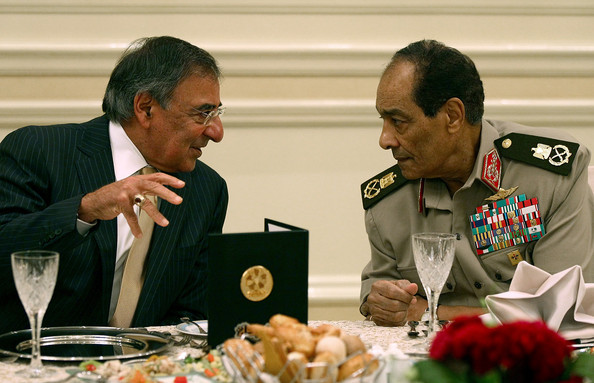
The Egyptian street has erupted once again. As before, people around the world are riveted by the surge of protests rocking Cairo, Alexandria, Assiut, Ismailia, Mahalla, Mansoura, Suez, and elsewhere. What is particularly breathtaking about the recent events is not only the rapid spread of the uprising, but the (previously unthinkable) demand to end 60 years of military rule in Egypt. This makes the ouster of Mubarak look like child’s play in comparison. It also places US officials in an even bigger dilemma than before. After all, a single dictator is replaceable. But the institutionalized power of the Egyptian military may be less easy to bend.
Back in February, Chairman of the Joint Chiefs of Staff Mike Mullen praised the professionalism of the Egyptian army in their handling of the mass uprising, as they largely respected the right of the people to protest. American officials like to take at least partial credit for the restraint exercised by the Egyptian army. They believe that US military aid to Egypt buys the US influence, just as they believe that training Egyptian officers in American military academies instills them with democratic values. This narrative is comforting, not to mention self-congratulatory. Perhaps this is why few seem interested in subjecting it to empirical scrutiny.
I consider myself very fortunate to have lived in Egypt for several years and to have been in Cairo throughout the entire period of what has become known as the “Egyptian Revolution.” I saw with my own eyes how, when army tanks rolled into Tahrir on January 28, Egyptians celebrated the soldiers as liberators. But things have changed. One week into Egypt’s “Second Revolution”, more than forty people have been killed and thousands have been injured. Many more languish in prison, and over 12,000 civilians are being tried in military tribunals. The recent violence is but the culmination of months of human rights abuses that have become increasingly macabre. In March, women who dared to stage a demonstration on International Women’s Day were subjected to forced “virginity tests.” In April, junior officers who openly protested against the Supreme Council of Armed Forces (SCAF) were shot on Tahrir. In October, Coptic Christians who were demanding that their churches be protected, were run over and dismembered by armored personnel carriers. One may well ask what has become of the ‘professionalism’ of the US-trained Egyptian army?
In response to the most sustained violence since February, White House spokesman Jay Carney said on Tuesday: “We call on all sides to exercise restraint.” The only problem is, one side uses tanks, rubber bullets, and live ammunition, while the other side jerry-rigs cooking pots into makeshift helmets. Should the protesters abstain from their home-made self-protection devices? Or shout their demands for freedom and civilian rule a little less loudly?
If the Obama administration was truly interested in “restraint” being exercised, it could in fact do more than issue inane statements.
From 1948-2011, Egypt has received $71.6 billion in foreign aid from the United States, including $1.3 billion annually in military aid from 1987 until now. Despite all the uncertainties of the so-called “transitional phase,” the Obama Administration has already requested $1.3 billion for the next fiscal year.
While the SCAF gladly pockets this American money, it regards any American (or other outside) support for civil society as “foreign interference.” Foreigners are only allowed to support the Egyptian military, not Egyptian civilians.
The SCAF along with several cabinet ministers began a veritable witch hunt this past summer against youth activists, in particular the April 6 movement, accusing them of receiving foreign funding. Apparently the Egyptian military, which likely receives more external funding than any other institution in the country, saw no irony in their attempting to delegitimize their youthful critics by accusing them of receiving support from foreign donors. The Ministry of Justice was instructed to conduct an investigation into the matter. In their recent report, which did not receive much attention due to the ongoing events, they found that the April 6 movement has not received any foreign funding. Leaders of the April 6 movement are now demanding that the SCAF publicly apologize. But the Supreme Council is far from acknowledging any wrongdoing about anything.
On the contrary, the generals continue undeterred in propagating the outlandish lie that “foreign forces” are behind the uprising, peddling the exact same line as Mubarak, and shamelessly attempting to incite xenophobia.
Although some members of Congress have supported placing conditions on US aid to Egypt, the Administration has consistently blocked this, fearing it will alienate the SCAF. In a press conference in Cairo on September 28, Secretary of State Clinton praised the military, saying “We also believe that the army has played a very stabilizing, important role during this period…” She then went on to say: “I want Egyptians to know that the Obama Administration opposes conditionality and do not believe that’s in the best interest of our relationship.”
During the “first revolution”, I took hundreds of pictures on Tahrir, many of which contained messages directed to the United States. One of them read, “US aid killed our people.” Another read: “USA: support the people, not the tyrant.” One of the most blunt was a sign stating simply: “America: F**k your aid.” Egyptians were angry back then, but now they’re outraged. If the United States continues to unconditionally support the military junta, it will lose the Egyptian people.
Amy Austin-Holmes has been an assistant professor at the American University in Cairo since 2008, where she teaches classes on social movements, revolutions, and US foreign policy. She has a PhD from Johns Hopkins University and an MA from the Freie Universität Berlin. Her book manuscript Contentious Allies: Social Unrest and the American Military Presence in Turkey and Germany 1945-2005 is under contract with Cambridge University Press.
Photo Credit: Associated Press
